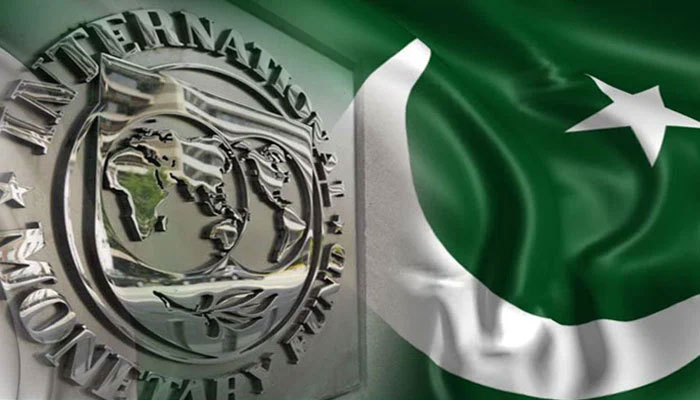Pakistan-IMF talks continue as breakthrough expected ‘in 72 hours’
Another meeting between Pakistan and the IMF is also scheduled for Saturday (today) for moving towards the desired objectives
ISLAMABAD: In last-ditch efforts to iron out differences in budgetary numbers, senior officials of Pakistan and IMF continued a round of parleys on Friday with the former expecting breakthrough within the next 72 hours.
The government took the toughest measures to end fuel subsidies and hiked the POL [petrol, oil, lubricants] prices up to unprecedented levels in order to convince the Fund to revive the programme. However, the IMF is still insisting on doing more knowingly that Islamabad has turned into a ‘desperate borrower’ mainly owing to depletion of foreign currency reserves.
Top official sources confirmed to The News on Friday that the IMF staff had not yet shared the first draft of the Memorandum of Financial and Economic Policies (MEFP) with Pakistani authorities. Now another meeting between Pakistan and the IMF is also scheduled for Saturday (today) for moving towards the desired objectives.
The sharing of draft MEFP is a prerequisite for moving towards the signing of the staff-level agreement as it provides the basis of a framework on which both sides evolve consensus and then this signed document duly by the Minister for Finance and Governor Central Bank is forwarded before the IMF’s Executive Board for seeking approval for completion of pending review and release of the next tranche.
One top official disclosed that Finance Minister Miftah Ismail held a virtual meeting with the IMF’s Mission Chief, which was also attended byDirector IMF dealing with Pakistan on Friday evening and both sides made some ‘positive progress’ for evolving a consensus on MEFP.
One top official of the Finance Division said that the Minister for Finance and Minister of State for Finance held a meeting with US ambassador on Thursday but it would not be sufficient as Islamabad would have to establish ‘contacts’ with the US Treasury high-ups to muster up the required support after evolving a consensus on the framework on the basis of which both sides could make progress for signing MEFP document.
“Without broader agreement on the basis of framework, no one could help Pakistan,” said the official and cited an example that when the framework was agreed, then Washington’s help could be sought on one or two critical outstanding issues between the two sides.
They were of the view that in the past if the both sides could not evolve a consensus on exact parity of exchange rate, then the influence of key countries such as the US or EU could be sought.
The outstanding issues between the two sides included revised rates on Personal Income Tax (PIT) for salaried class, projection of petroleum levy to the tune of Rs750 billion, working out of power sector subsidies as well as Utility Stores Corporation (USC) subsidies for the next budget.
-
 All You Need To Know Guide To Rosacea
All You Need To Know Guide To Rosacea -
 Princess Diana's Brother 'handed Over' Althorp House To Marion And Her Family
Princess Diana's Brother 'handed Over' Althorp House To Marion And Her Family -
 Trump Mobile T1 Phone Resurfaces With New Specs, Higher Price
Trump Mobile T1 Phone Resurfaces With New Specs, Higher Price -
 Factory Explosion In North China Leaves Eight Dead
Factory Explosion In North China Leaves Eight Dead -
 Blac Chyna Opens Up About Her Kids: ‘Disturb Their Inner Child'
Blac Chyna Opens Up About Her Kids: ‘Disturb Their Inner Child' -
 Winter Olympics 2026: Milan Protestors Rally Against The Games As Environmentally, Economically ‘unsustainable’
Winter Olympics 2026: Milan Protestors Rally Against The Games As Environmentally, Economically ‘unsustainable’ -
 How Long Is The Super Bowl? Average Game Time And Halftime Show Explained
How Long Is The Super Bowl? Average Game Time And Halftime Show Explained -
 Natasha Bure Makes Stunning Confession About Her Marriage To Bradley Steven Perry
Natasha Bure Makes Stunning Confession About Her Marriage To Bradley Steven Perry -
 ChatGPT Caricature Prompts Are Going Viral. Here’s List You Must Try
ChatGPT Caricature Prompts Are Going Viral. Here’s List You Must Try -
 James Pearce Jr. Arrested In Florida After Alleged Domestic Dispute, Falcons Respond
James Pearce Jr. Arrested In Florida After Alleged Domestic Dispute, Falcons Respond -
 Cavaliers Vs Kings: James Harden Shines Late In Cleveland Debut Win
Cavaliers Vs Kings: James Harden Shines Late In Cleveland Debut Win -
 2026 Winter Olympics Snowboarding: Su Yiming Wins Bronze And Completes Medal Set
2026 Winter Olympics Snowboarding: Su Yiming Wins Bronze And Completes Medal Set -
 Trump Hosts Honduran President Nasry Asfura At Mar-a-Lago To Discuss Trade, Security
Trump Hosts Honduran President Nasry Asfura At Mar-a-Lago To Discuss Trade, Security -
 Cuba-Canada Travel Advisory Raises Concerns As Visitor Numbers Decline
Cuba-Canada Travel Advisory Raises Concerns As Visitor Numbers Decline -
 Anthropic Buys 'Super Bowl' Ads To Slam OpenAI’s ChatGPT Ad Strategy
Anthropic Buys 'Super Bowl' Ads To Slam OpenAI’s ChatGPT Ad Strategy -
 Prevent Cancer With These Simple Lifestyle Changes
Prevent Cancer With These Simple Lifestyle Changes




